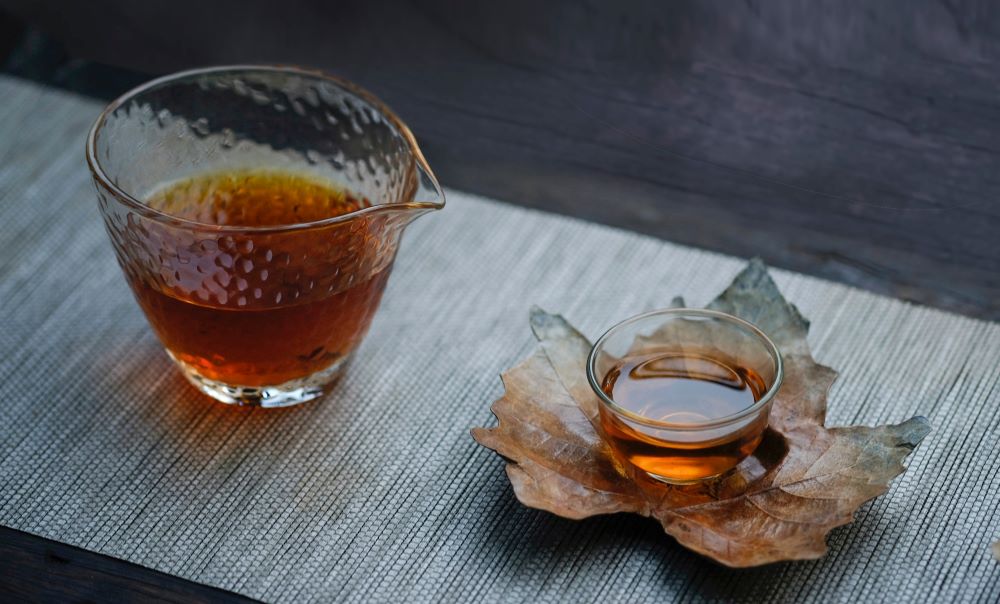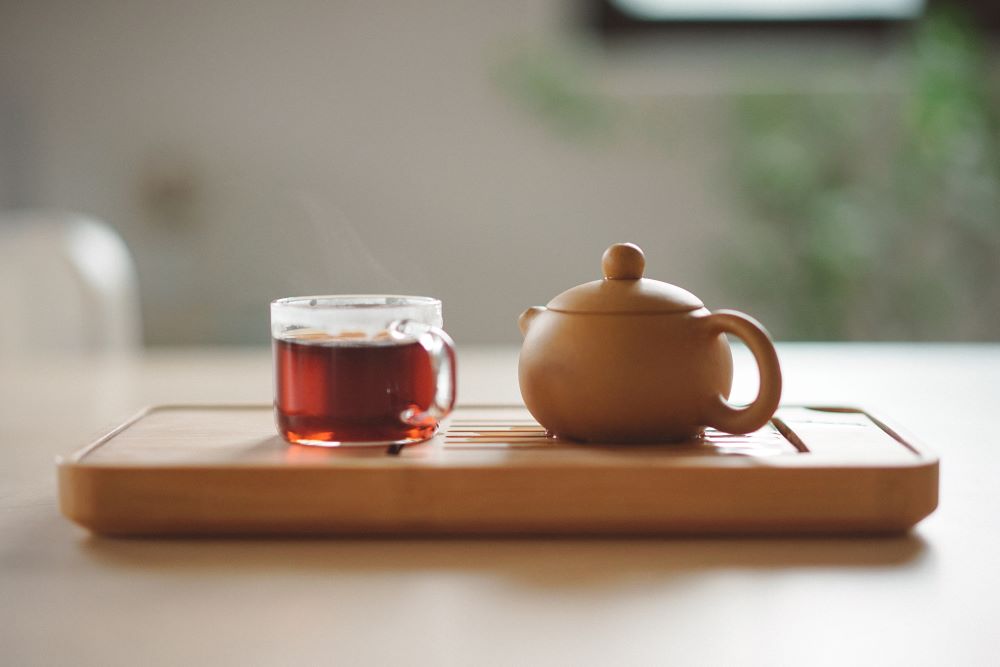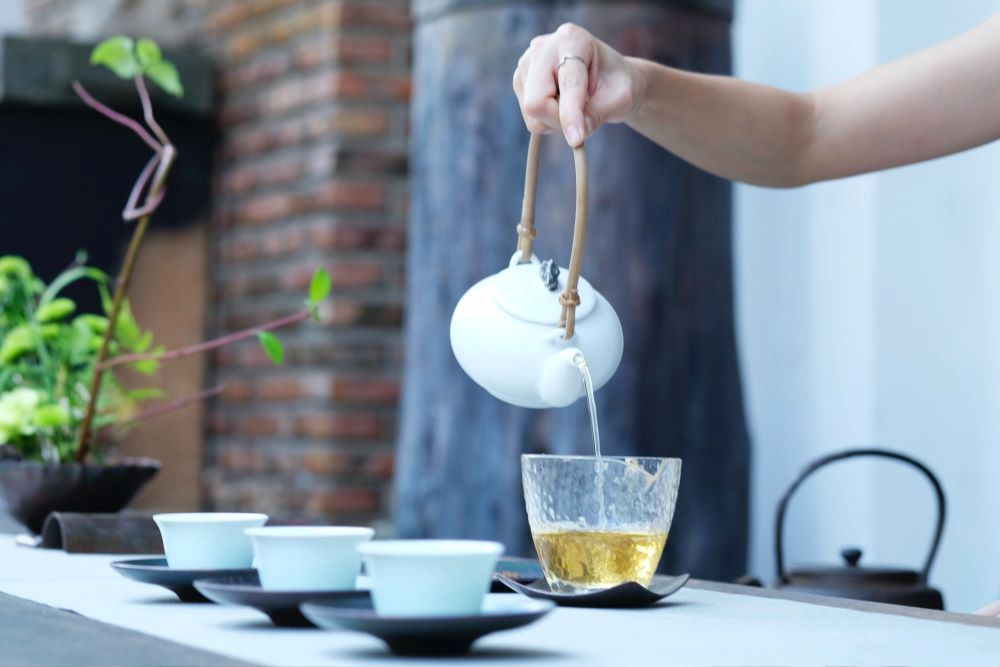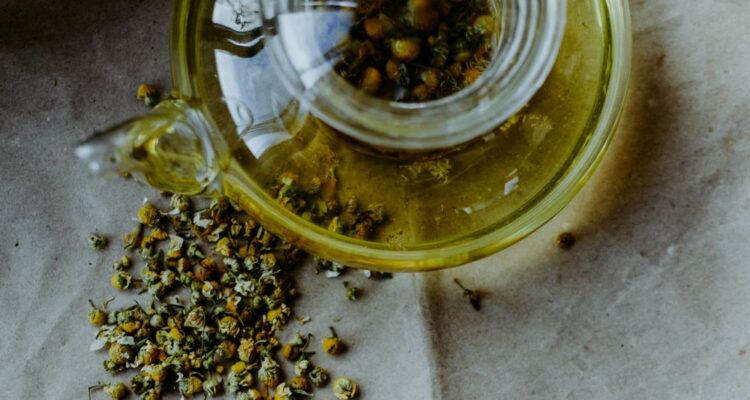When sleep evades us, it can have a huge impact on our physical and mental health. But could it be as simple as drinking the right thing before bed to ease us into the Land of Nod?
Herbalists have long endorsed the sleeping enhancing effects of herbal teas and now so have medical scientists. There are a variety of popular herbal teas that claim to help you sleep. Scientifically verified teas for effectively putting insomnia to bed include the well-known Chamomile and Lavender teas as well as Valerian Root, Rooibos and Lemon balm.
All these teas have different properties, different pharmacological actions, different tastes, and different added benefits. Some even have a few precautions worth noting. Finding your perfect match could be key to helping you get a good night’s sleep.
Table of Contents
What is a Herbal Tea?
The term “herbal tea” is actually slightly inaccurate. Although called a “tea,” this is not technically correct as herbal teas are not made from the tea plant known as Camellia sinensis. Instead, herbal teas are made by pouring hot water over flowers, leaves, roots, or even whole plants to create a herbal infusion. They can sometimes also be referred to as a tisane which describes the same process.
Tisanes and herbal teas rarely have caffeine in them which means they will not keep you awake at night by stimulating your brain. Nor will the caffeine irritate your bladder and wake you because you need the loo.
Herbal teas have grown in popularity due to the wide range of health benefits they offer when consumed regularly.
The Best Herbal Teas to Help You Sleep
1. Chamomile

Scientific Name: Matricaria chamomillaL.
Tea Taste: A gentle floral taste with hints of crisp apple.
Tea Preparation: Chamomile tea is made from the delicate white flowers of the chamomile plants. The tea can be prepared from either fresh or dried flowers. When making the tea from fresh chamomile flowers, it is important to ensure that the plant is organically grown because you don’t want any pesticides in your tea.
If you are using fresh flowers, you can place them directly into your teacup. Slowly pour hot water over the fresh flowers, let the tea steep for 5 to 7 minutes, and then remove the flowers. Chamomile tea may be drunk with or without additional sweetener. Chamomile tea should be drunk 45 minutes before bedtime for the best effects.
Additional Health Benefits
Chamomile, in addition to being a mild sedative with a somnolent (causes a feeling of sleepiness), has also been found to have anticonvulsant (prevents seizures) and anti-anxiolytic (preventing anxiety by inducing relaxation) effects.
How It Works
Chamomile is one of the most widely used herbal remedies to aid sleep. It is thought that the effect of the tea is due to the apigenin flavonoid that binds to receptors in the brain.
Like the pharmaceutically regulated Benzodiazepines, apigenin enhances the action of gamma-aminobutyric acid (GABA) on GABA type-A receptors. Stimulation of GABA receptors has various effects on the central nervous system, one of which is the activation of the sleep centres in the brain and inhibition of the stress response. Chamomile is much safer than benzodiazepines and will not cause physiological dependence.
Side Effects and Precautions
Chamomile can cause anaphylaxis (severe allergic reaction) and vomiting when taken in large amounts. Chamomile has no known drug interactions and is considered a safe herb for ingestion.
Where to get it from: Chamomile is widely available in most pharmacies and supermarkets in the UK. Amazon sells both organic loose-leaf chamomile tea and chamomile tea bags.
2. Valerian Root

Scientific Name: Valeriana officinalis L.
Tea Taste: Valerian tea is made from the root of the valerian plant. It typically grows well in moist grasslands or grassy areas, and this is reflected in the taste of the tea, which has a distinct woody flavour. The flavour intensifies the longer the tea is left to steep, as does the pungent aroma.
Tea Preparation: Any part of the valerian plant can be used to make the tea; however, the most effective part to help you sleep is the valerian root. It is safe to consume tea made from a fresh root; however, the potency and effectiveness are best when using dried root powder.
When making valerian tea, use one teabag or a heaped teaspoon of dried root powder in a cup (about 265ml) of hot water. Once your kettle has boiled, allow it to sit for 2 to 3 minutes before pouring it over the dried valerian root; hot water is better than boiling water for this tea. The tea should be allowed to steep for 10 – 15 minutes before removing the teabag or straining the powder out.
Valerian can be something of an acquired taste that few people acquire! Honey, milk, and a slice of lemon can be added to the tea to improve its palatability. Often you will also find it in teas combined with other, more flavoursome, ingredients. Despite the unappealing taste and smell, valerian remains one of the most effective herbal teas for curing insomnia. Valerian produces results comparable to many pharmaceutical sleeping tablets but without the side effects. It’s up to you to decide if the taste and smell are worth a good night’s sleep.
The recommended dosage for insomnia is 350 – 500mg of valerian consumed at bedtime. Valerian tea should be consumed 30 minutes to an hour before bedtime. People often feel sleepy even after the first cup, but the most effective results are obtained after taking valerian tea daily for a few days.
Additional Health Benefits
Valerian has additional health benefits besides treating insomnia, primarily relating to relaxation and sedation of the central nervous system. Valerian is used in the management of attention deficit disorder with hyperactivity, anxiety, depression, seizure disorders, restless leg syndrome, chronic fatigue, and menstrual cramps.
How It Works
Like chamomile, valerian helps the binding of GABA to GABA-A-receptors. Chemicals called sesquiterpenoids and valepotriates found in valerian root bind to part of the GABA-A receptors. This encourages GABA to hold on tightly to the GABA-A receptors causing the neurons in your brain to become less responsive to stimuli and making you feel sleepy. Your racing thoughts and daily stress can no longer keep your brain awake, and you gently drift into sleep.
Side Effects and Precautions
Some people report that valerian may cause dependency when taken for a long period and should not be taken for more than a month unless advised by a healthcare professional. Other side effects that can occur when consuming valerian are morning drowsiness, heart effects, damage to liver cells, a feeling of unease or agitation, and headaches.
Due to the potential effects of valerian on the heart and liver, you should always seek the advice of a doctor or herbalist before consuming valerian tea if you are on chronic medication, have a heart condition, or liver disease.
Valerian does have a mild interaction with two cancer-treating drugs and registered moderate interactions with 43 pharmaceutical drugs and serious interactions with 67 drugs. No severe interactions have been identified.
Where to get is from: Valerian tea is easily ordered from Amazon, as well as the teas where it is in combination with other ingredients.
3. Lavender

Scientific Name: There are a variety of lavender species that can be used to make lavender tea, but the most commonly cultivated lavender is Lavandula angustifolia.
Tea Taste: There are over 39 lavender species that can be used to make lavender tea, each providing a slightly different taste experience. Lavender has a smoky undertone with a distinctive floral flavour. Some lavender flavours are sweet enough that you can happily bypass the honey! The aromatic flowers are central to the lavender tea experience as they stimulate the sensory centre in your brain. The leaves and stems of the plant are not included as they don’t contribute to the taste or aroma of the tea.
Tea Preparation: Many herbal tea aficionados claim that lavender tea is most flavourful when brewed from loose fresh or dried flowers. They staunchly argue that the use of lavender tea bags brews an inferior cup of tea. However, for those of you in a rush to get the tea made, a tea bag may be less time-consuming than working with loose lavender flowers.
When brewing lavender, it is essential to ensure that the water is not boiling as you pour it over the lavender flowers. Scalded flowers do not release the floral aroma so well and if also taints the taste. When making a simple lavender tea, you use 2 heaped teaspoons of fresh or dried lavender flowers for every 250ml of hot water. Allow the tea to steep for 10 minutes before removing the loose flowers from the tea infuser. Lavender tea is best drunk 30-45 minutes before bedtime.
Lavender tea can also be turned into a refreshing iced tea, especially when combined with chamomile, mint, or berries for a double dose of herbal goodness. Lavender tea also works with an extra dose of honey added into it, but many people drink it without any sweetener.
Drinking lavender tea is not meant to be a rushed experience hurriedly squeezed in-between your nightly chores. Snuggle up in your bed with a good book or gentle music and let the soothing aromatic taste of warm honey-sweetened lavender works its magic on your senses.
Additional Health Benefits
As with most herbal remedies, there is limited scientific evidence to verify the many benefits of lavender proclaimed by herbalists. Lavender has been proven to be effective as a supportive treatment for anxiety, depression, post-operative C-section pain, migraines, and tension headaches when ingested. Many herbalists prescribe lavender for various other health conditions, but the effectiveness has not yet been proven scientifically.
How It Works
Although the exact mechanism of action is unknown, there have been many studies performed that indicate that lavender is effective at helping you fall asleep and improving the quality of your sleep. Both chamomile and valerian help you fall asleep, but they don’t improve the quality or duration of your sleep. A study conducted by Baltimore nurses in 2014 found that ICU patients fell asleep easier and had a better sleep quality than patients who had no exposure to lavender. Similarly, a group of post-partum Taiwanese women were found to have improved sleep scores when drinking lavender tea.
Side Effects and Precautions
Some people have reported that lavender can cause constipation and headaches when eaten. It also possesses chemicals similar in structure to estrogen and it’s generally advisable that males under 20yrs and women who are pregnant or breastfeeding should avoid ingesting excessive amounts.
Lavender use should be stopped at least 2 weeks before surgery as its effects on the central nervous system can affect the efficacy of the anaesthetic drugs used. Lavender has moderate interactions with chloral hydrate, high blood pressure medications, and many sedative medications, including barbiturates, benzodiazepines, and drugs acting on the central nervous system.
Where to get is from: Loose-leaf lavender tea can be bought online as well as teabags. Some, such as Cotswold Lavender, demonstrate the regionality of the product whilst others combine lavender with other ingredients.
4. Rooibos

Scientific Name: Aspalathus linearis
Tea Taste: Rooibos has a soothingly sweet taste that is warm, full-bodied, and rich when left to steep. A subtle, nutty, woody flavour underpins the gentle aroma of rooibos.
Tea Preparation: Rooibos tea is prepared like most other herbal teas. Pour hot water over the tea bag or tea infuser containing the tea leaves and allow to steep for 5 minutes. Many enjoy drinking rooibos with honey and milk.
Rooibos tea can be combined with many other flavours to produce a variety of taste sensations. Hot rooibos vanilla chai is a thing of dreams! Many fruits work well when combined with a rooibos base in iced tea recipes. Recipe ideas for iced rooibos teas can be found on Yummly.
Unlike most other herbal teas, rooibos does not need to be drunk right before bedtime. Instead, it is best to drink 6 or more cups of rooibos throughout the day. The regulation of your stress response and decreasing stress throughout your day is the key to drinking rooibos. By the time you reach bedtime, this more relaxed state should pay dividends as you ease into sleep.
Additional Health Benefits
Rooibos is an incredible herb. It has been endorsed by the Cancer Association of South Africa for its anti-carcinogenic (fighting cancer) properties. Research has also found that it is effective in treating diabetes, hypertension (high blood pressure), immune-boosting, and increasing male fertility.
How It Works
As a South African plant, rooibos is a relative newcomer to the global platform of herbal remedies for insomnia. Recent research done by the Stellenbosch university found that rooibos actively inhibits the production and action of cortisol, one of the primary stress hormones. It is thought that two flavonoids, aspalathin and nothofagin, are responsible for rooibos’s inhibition of cortisol. Aspalathin is unique to rooibos, and only a few plants besides rooibos contain nothofagin.
Unlike many other somnolent-inducing herbs that act on the GABA system to produce a feeling of drowsiness, rooibos inhibits the brain’s stress response allowing you to fall asleep naturally and wake up alert, ready to tackle the day. Rooibos contains no caffeine and can be taken throughout the day.
Side Effects and Precautions
Rooibos has no known side effects or interactions with other medications. It is safe for children, breastfeeding, and pregnant women.
Where to get it from: Once again, Rooibos comes in loose leaf and tea bag forms. For a bit of indulgence try making a latte.
5. Lemon balm

Scientific Name: Melissa officinalis
Tea Taste: Lemon balm tea is one of the more palatable herbal teas. Its sweet citrusy flavour with floral notes is easy to enjoy.
Tea Preparation: Lightly crush the lemon balm leaves before placing them in the tea infuser, ensuring the oils will be released when brewing. Pour hot water slowly over the tea infuser and allow it to steep for 10 minutes. It’s important not to scald the leaves by pouring boiling water directly onto the leaves. Strain the leaves out of the tea. Add honey and enjoy!
The medicinal effects of lemon balm are most potent when 1.5g to 4.5g of lemon balm are infused in 150ml of hot water for 10 – 15 minutes and taken 1-3 times per day.
Additional Health Benefits
Lemon balm works to reduce stress. It improves memory, concentration, calmness, and alertness.
How It Works
Lemon balm flavonoids have a moderate affinity for the central nervous system GABA-A benzodiazepine receptor site. The sleepiness effects are similar to those experienced with chamomile and valerian.
According to Taibi and Landis, lemon balm often works best when combined with other herbs, particularly valerian root. One compelling study found that 80.9% of children with sleep disturbances showed an improvement in duration and quality of sleep when dosed with a mixture of valerian and lemon balm. The study was carefully supervised and monitored by medical professionals. Children should not be given herbal remedies without first speaking to an experienced herbalist or medical doctor.
Side Effects and Precautions
Lemon balm is generally regarded as safe, with few documented side effects. Anecdotally people have reported mild symptoms such as headaches, nausea, skin rashes, and heart palpitations. People using sedatives, pregnant or breastfeeding women, children, and individuals with thyroid conditions should not use lemon balm unless prescribed by their doctor or herbalist.
Where to get it from: Organic loose leaf lemon balm is readily available online. Alternatively, you can buy and grow your lemon balm plants for the freshest, most potent lemon balm tea.
Conclusion
Herbal teas are fast-growing in popularity as safe alternatives to traditional sleeping medication. Unlike most sleeping medications, herbal teas allow you to wake up alert and feeling refreshed.
Bedtime need not be a time of stress, involving a thousand positions, desperate prayers, perfect lighting, and still no sleep. Instead, the busy mind may be lulled into a soothing state of relaxation by the gentle aroma, pleasant taste, and calming rituals surrounding herbal tea.
Try a few different options to see which works for you. Don’t be afraid to mix and match your favourite flavours. Pick a few, sniff them, brew them, drink them and then get to snoozing! Choose the beverage that makes your taste buds sing and your eyelids droop; courtesy of nature’s gift in herbal teas.
My Supplement Recommendations
These are products that I currently use and enthusiastically recommend:
Multivitamin – Nutrigenesis Multi for Men or Nutrigenesis for Women. Performance Lab use their patented Nutrigenesis technique to provide a range of vitamins and minerals in their most effective form. Read my review.
Nootropic – Mind Lab Pro contains eleven natural nootropics that have been proven to support cognitive function and brain health. Read my review.
Collagen – Edible Health Bovine Collagen. This excellent bovine collagen powder is completely tasteless and absorbs quickly into any liquid. It’s third-party lab tested and provides 13g of collagen per serving. Read my review.
Turmeric – VitaBright Organic Turmeric with Ginger and Black Pepper. These turmeric capsules are organic, effective and affordable. They include black pepper to enhance curcumin absorption and ginger to provide additional useful benefits. Read my review.
Incredible value – G&G Vitamin 28 day packs This is the most affordable way to buy supplements in the UK. One tub holds 28 daily packs of up to 11 different vitamins, minerals or food supplements.
Related reading
You may also be interested in reading 7 Top Tips for a Better Night’s Sleep, Performance Lab’s Sleep supplement, Best Matcha Powder UK, The 9 Best Herbal Teas and The 4 Best Herbal Teas for Relaxation.
If you’re looking for supplements, vitamins, minerals or just some helpful information, we have some other lists that you may find useful.
- All vitamin and mineral lists
- Best Collagen Supplements UK
- Turmeric Supplements
- Best Ashwagandha
- Best Multivitamins
- Nootropic Supplements
- Best Mushroom Supplements
- Greens Blend Supplements UK
This site is a participant in affiliate advertising programs designed to provide a means for sites to earn advertising fees by advertising and linking to products and services. We participate in programs from Amazon, eBay, CJ, Awin, Viglink and other sites. We are compensated for referring traffic and business to companies linked to on this site.

